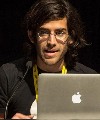-
(b.) -1986 November 08(d.)2013
Bio/Description
An American computer programmer, writer, political organizer, and Internet activist, he was involved in the development of the web feed format Rich Site Summary (RSS), the organization Creative Commons, the website framework web.py, and the social news site Reddit. He was born in Chicago, Illinois, the son of Susan and Robert Swartz. His father founded a software company, and from an early age, he immersed himself in the study of computers, programming, the Internet, and Internet culture. At age 13, he won the ArsDigita Prize, a competition for young people who create ?useful, educational, and collaborative? noncommercial websites. The prize included a trip to Massachusetts Institute of Technology (MIT) and meetings with Internet notables. At age 14, he was a member of the working group that authored the RSS 1.0 web syndication specification, a lesser-used offshoot of an earlier RSS version. Yahoo! News correspondent Virginia Heffernan said of him, ?he agitated without cease?or compensation?for the free-culture movement.? He attended North Shore Country Day School, a small private school in Winnetka, Illinois. He served on the RDF Core working group at the World Wide Web Consortium (W3C), and authored RFC 3870, defining the RDF/XML Internet media type. He later attended Stanford University, but he left after a year. Instead he founded the software company Infogami, a startup that was funded by Y Combinator?s first Summer Founders Program. Through the Y Combinator program, he started the wiki platform Infogami (later used to support the web.py and Open Library sites), but he felt he needed co-founders to proceed. Y-Combinator organizers suggested that Infogami merge with Reddit, which it did in November 2005. While Reddit initially found it difficult to make money from the project, the site later gained in popularity, with millions of users visiting it each month. In late 2006, after months of negotiations, Reddit was acquired by Cond? Nast Publications, owners of Wired magazine. He moved with his company to San Francisco to work on Wired. The move to Wired did not work out well for him as he was fired soon after. He was also the creator of the web.py Web application framework. He volunteered as an editor at Wikipedia, and in 2006, he ran for the Wikimedia Foundation's Board of Directors, but he was unsuccessful. Also in 2006, Swartz wrote an analysis of how Wikipedia articles are written, and concluded that the bulk of the actual content comes from tens of thousands of occasional contributors, or "outsiders", each of whom may not make many other contributions to the site, while a core group of 500 to 1,000 regular editors tend to correct spelling and other formatting errors. Also, around 2006, he acquired the Library of Congress's complete bibliographic dataset: the library charged fees to access this, but as a government document, it was not copyright-protected within the USA. By posting the data on Open Library, he made it freely available. The Library of Congress project, unlike the PACER or JSTOR cases, was met with approval by the Copyright Office. In September 2007, he joined with Simon Carstensen and launched Jottit. He was co-creator, with John Gruber, of Markdown, a simplified markup standard derived from HTML, and author of its html2text translator. Markdown remains in widespread use. In 2008 he founded Watchdog.net, ?the good government site with teeth,? to aggregate and visualize data about politicians. He was a co-founder of Demand Progress, an advocacy group that organizes people online to ?take action by contacting Congress and other leaders, funding pressure tactics, and spreading the word? about civil liberties, government reform, and other issues. He later worked with the activist groups Rootstrikers and Avaaz, and was a contributing editor to The Baffler. In 2010?11, he was a research Fellow at Harvard University′s Edmond J. Safra Research Lab on Institutional Corruption. Author Cory Doctorow, in his novel, Homeland, ?drew on advice from him in setting out how his protagonist could use the information now available about voters to create a grass-roots anti-establishment political campaign.? In an afterword to the novel, he himself wrote, ?These [political hacktivist] tools can be used by anyone motivated and talented enough?Now it?s up to you to change the system. Let me know if I can help.? He was involved with a campaign to prevent the passing of the Stop Online Piracy Act (SOPA), which sought to combat Internet copyright violations but was criticized on the basis that it would have made it easier for the U.S. government to shut down websites accused of violating copyright. Following the defeat of the bill, he was the keynote speaker at the F2C:Freedom to Connect 2012 event in Washington, D.C., on May 21, 2012. His speech was titled ?How We Stopped SOPA? and he informed the audience: ?This bill ? shut down whole websites. Essentially, it stopped Americans from communicating entirely with certain groups.? On January 6, 2011, he was arrested by a federal special agent on state breaking-and-entering charges in connection with systematic downloading of academic journal articles from JSTOR. Federal prosecutors eventually charged him with 2 counts of wire fraud and 11 violations of the Computer Fraud and Abuse Act, carrying a maximum penalty of up to 35 years in prison and a $1 million fine plus forfeiture, restitution, and supervised release. After facing charges for two years, on January 11, 2013, he was found dead in his Crown Heights, Brooklyn apartment where he had committed suicide.
-
Date of Birth:
1986 November 08 -
Date of Death:
2013 -
Noted For:
Co-developer of the web feed format Rich Site Summary (RSS), the organization Creative Commons, the website framework web.py, and the social news site Reddit -
Category of Achievement:
-
More Info:


